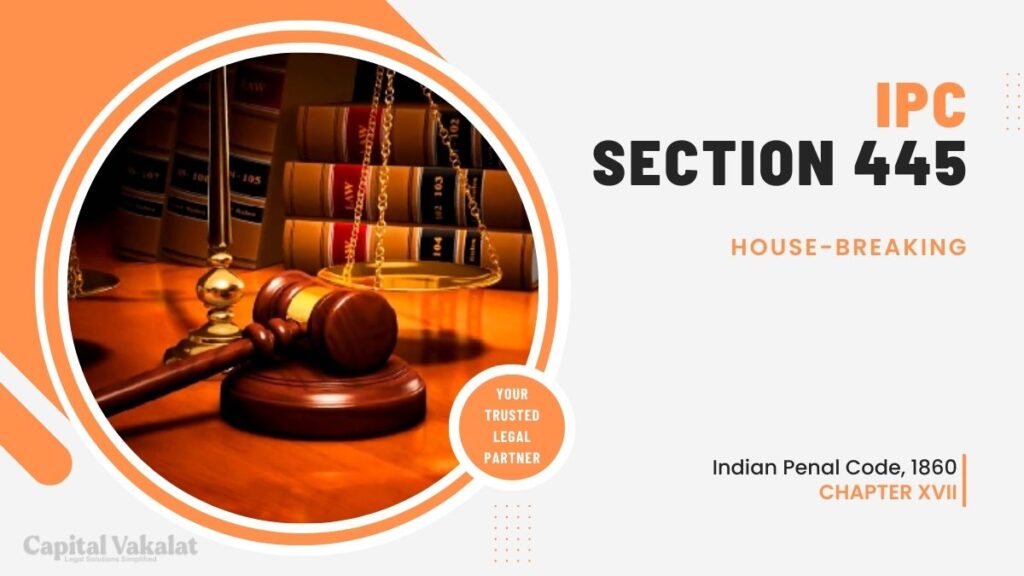House-breaking, as defined under Section 445 of the Indian Penal Code (IPC), is a critical legal aspect that plays a pivotal role in maintaining public order and safety. This section outlines the various aspects of breaking into a house or any dwelling with the intention to commit an offense.

Understanding the intricacies of Section 445 IPC is essential for both legal professionals and the general public to navigate the complexities of house-breaking laws effectively.
Elements of House-breaking
Section 445 IPC encompasses a wide range of activities classified as house-breaking, each with its unique characteristics. From trespassing with intent to commit a crime to forcefully entering a residence, the section aims to address diverse scenarios. The definition and scope of house-breaking under Section 445 IPC provide a comprehensive framework for legal interpretation and application.
Criminal Intent and Mens Rea
One of the fundamental aspects of any house-breaking case is establishing criminal intent and mens rea, the guilty mind. Proving that the accused had the intention to commit an offense when entering a premises is crucial for a successful prosecution. Legal professionals often delve into the mindset of the accused to ascertain the presence of mens rea, making it a vital component of house-breaking cases.
Penalties and Punishments
The severity of penalties outlined in Section 445 IPC emphasizes the gravity of house-breaking offenses. The legal consequences vary based on factors such as the nature of the offense, the presence of weapons, and the potential harm caused. Understanding the nuances of these penalties is essential for both the legal fraternity and the public to comprehend the legal repercussions associated with house-breaking.
Legal Defenses
Individuals accused of house-breaking often rely on legal defenses to challenge the charges brought against them. From claiming mistaken identity to proving lawful entry, a range of defenses can be employed. The effectiveness of these defenses depends on various factors, including the circumstances surrounding the alleged house-breaking incident.
Landmark Cases and Precedents
A review of landmark cases and legal precedents related to Section 445 IPC provides valuable insights into the evolution of house-breaking laws. Analyzing past judgments helps in understanding how the legal system interprets and applies the provisions of Section 445 IPC, influencing future cases and legal decisions.
Role of Evidence in Prosecution
The role of evidence in house-breaking cases cannot be overstated. Types of evidence, including eyewitness accounts, surveillance footage, and forensic analysis, play a crucial role in establishing guilt or innocence. Evaluating the admissibility and reliability of evidence is a complex process that significantly impacts the outcome of legal proceedings.
Reform and Amendments
Over the years, Section 445 IPC has undergone changes through amendments and reforms. Examining the historical context of these modifications provides a broader perspective on the legislative intent and societal considerations that influenced house-breaking laws. Ongoing discussions about potential reforms highlight the dynamic nature of criminal legislation.
Public Awareness and Prevention
Creating awareness among the public about the provisions of Section 445 IPC is integral to preventing house-breaking incidents. Knowledge about legal consequences acts as a deterrent, contributing to community safety. Additionally, implementing measures such as neighborhood watch programs and improved security systems can aid in preventing house-breaking attempts.
Conclusion
In conclusion, Section 445 IPC serves as a cornerstone in addressing and deterring house-breaking offenses. The multifaceted nature of house-breaking laws requires a nuanced understanding of legal provisions, criminal intent, and the role of evidence. Landmark cases and ongoing discussions about reforms further shape the landscape of house-breaking laws, emphasizing the need for continuous awareness and vigilance within society.
Frequently Asked Questions
How is mens rea established in house-breaking cases?
Mens rea, the guilty mind, is established by proving the accused’s intention to commit an offense when entering a premises, a crucial aspect of house-breaking prosecutions.
What are common legal defenses against house-breaking charges?
Common legal defenses include mistaken identity, proving lawful entry, and challenging the reliability of evidence presented in court.
How have amendments to Section 445 IPC impacted house-breaking laws?
Amendments to Section 445 IPC have influenced the legal landscape, reflecting changes in societal norms and legal interpretations of house-breaking offenses.
What preventive measures can individuals take to avoid house-breaking incidents?
Individuals can enhance security by participating in neighborhood watch programs, implementing robust security systems, and raising awareness about the legal consequences of house-breaking.